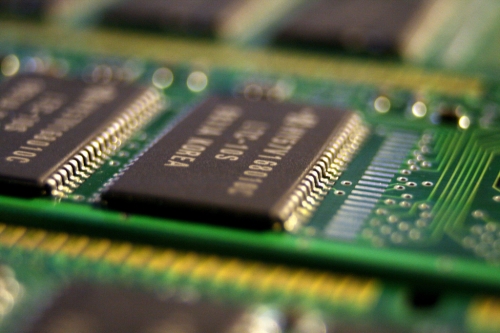Xrqute
New member
Smart Phones, Tablets, Mp3 players, any Mobile/Hand held device with on board storage could soon a see rapid expenditure of its storage capabilities in future models.

Rice University has made a breakthrough in the manufacturing of high-density memory chips. A group of researchers has made a breakthrough with computer memory chips that could mean terabytes of memory inside future smartphones. The breakthrough could mean tens to hundreds of times more storage in mobile devices.
Resistive random access memory or RRAM is the name of this new generation of memory currently under development by several leading tech companies. Making this sort of memory typically requires high-temperature or high-voltage making the chips hard to produce. Researchers at Rice University have made a breakthrough that allows the fabrication of these chips at room temperature and with a much lower voltage requirement.
RRAM is like flash memory in that it can store data without constant power supplied. RRAM stores data using resistance rather than charge in a transistor. Using resistance means each bit uses less space significantly increasing the amount of data that can be stored. These chips are also easier to stack leading to more capacity.
Taking a complete stab in the dark (likely completely wrong) I'd guess they are using some sort of miniaturized VDR (Voltage Dependent Resistor) which changes it's resistance with the application or removal of voltage (just like a Thermistor changes its resistance with the application of heat, They are used in modern Heat Detectors on Fire Detection Systems). To me it seems like a logical way of simply controlling the resistance (which acts like a gate) for each memory sector.
What do you think? Do you like the idea of being able to have your ENTIRE movie collection in your pocket 24/7?

Rice University has made a breakthrough in the manufacturing of high-density memory chips. A group of researchers has made a breakthrough with computer memory chips that could mean terabytes of memory inside future smartphones. The breakthrough could mean tens to hundreds of times more storage in mobile devices.
Resistive random access memory or RRAM is the name of this new generation of memory currently under development by several leading tech companies. Making this sort of memory typically requires high-temperature or high-voltage making the chips hard to produce. Researchers at Rice University have made a breakthrough that allows the fabrication of these chips at room temperature and with a much lower voltage requirement.
RRAM is like flash memory in that it can store data without constant power supplied. RRAM stores data using resistance rather than charge in a transistor. Using resistance means each bit uses less space significantly increasing the amount of data that can be stored. These chips are also easier to stack leading to more capacity.
Taking a complete stab in the dark (likely completely wrong) I'd guess they are using some sort of miniaturized VDR (Voltage Dependent Resistor) which changes it's resistance with the application or removal of voltage (just like a Thermistor changes its resistance with the application of heat, They are used in modern Heat Detectors on Fire Detection Systems). To me it seems like a logical way of simply controlling the resistance (which acts like a gate) for each memory sector.
What do you think? Do you like the idea of being able to have your ENTIRE movie collection in your pocket 24/7?
